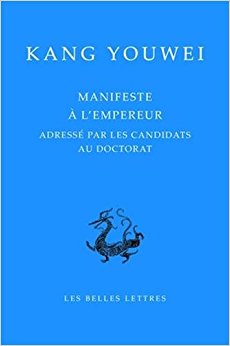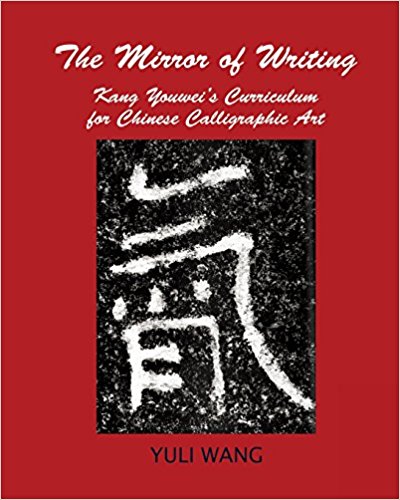Background
Kang Youwei was born in 1858 in Nanhai, Guangdong. While he greatly exaggerated his kinsmen’s scholarly accomplishments,it is also clear that he was born into a locally prominent gentry family which aspired after scholarly pursuit.



(The book includes 10 volumes. Based on the democratic equ...)
The book includes 10 volumes. Based on the democratic equalty and some socialist fantasy, it describes the beautiful scene of social harmomy in the future and puts up with many classic opinions.
http://www.amazon.com/gp/product/7532573478/?tag=2022091-20

(Redige le 2 mai 1895, au lendemain de la signature du tra...)
Redige le 2 mai 1895, au lendemain de la signature du traite de Shimonoseki qui cedait Taiwan au Japon, le Manifeste de Kang Youwei (1858-1927) adresse a l'empereur Guangxu elabore une serie de propositions concretes visant a la modernisation et au developpement economique de la Chine. Signe par quelque douze cents lettres, cet appel s'il ne fut pas immediatement entendu annonce l'ephemere Mouvement de reformes de 1898 dont Kang Youwei fut l'une des principales tetes pensantes. Pour la premiere fois, l'opinion publique semblait en mesure de peser sur le cours de l'Histoire. L'echec des reformes de 1898 et l'exil de ses herauts vont laisser le champ libre aux partisans de la voie revolutionnaire. Un autre horizon s'ouvre alors pour la Chine. Le Memoire a l'empereur adresse par les candidats au doctorat (1895) condense les idees de Kang Youwei pour mettre la Chine sur la voie de la modernite et de la puissance. son contenu prefigure l'evolution actuelle de la Chine et eclaire sur ses relations avec le reste du monde.
http://www.amazon.com/gp/product/2251110232/?tag=2022091-20

(This book is an annotated and illustrated translation fro...)
This book is an annotated and illustrated translation from The Mirror of Writing, by Kang Youwei (1889). It contributes to the study of modern Chinese art and culture, and to an understanding of the history and aesthetics of Chinese calligraphy. It contains more than 150 reproductions of the original illustrations. For a long time Chinese calligraphy was neglected by art historians in the West. In the United States, the cultural, scholarly, and artistic importance of the art of Chinese calligraphy has been featured in only three traveling exhibitions, which have focused on the pre-Modern period. However, modern Chinese calligraphy, like modern Chinese painting, has gone through its own kind of transformation and demonstrated the vitality of the calligraphic traditions as well as the potential for renewal of these traditions. In all the editions of The Mirror of Writing published since 1889, no illustrations have been given. By translating Book III "Buying Stone Rubbings," with reproductions of more than 150 originally illustations, Yuli Wang provides a concise introduction to the art of Chinese calligraphy.
http://www.amazon.com/gp/product/0996648488/?tag=2022091-20
Kang Youwei was born in 1858 in Nanhai, Guangdong. While he greatly exaggerated his kinsmen’s scholarly accomplishments,it is also clear that he was born into a locally prominent gentry family which aspired after scholarly pursuit.
Studied the Chinese classics within his family and with Zhu J'ujiang. Later studied daoism and Buddhism, and ln Shanghai became acquainted with Western thought. Passed traditional examinations in the Chinese classics.
To contribute to China’s self-strengthening, Kang sought out information about foreign countries. Not only did he read Chinese publications about the West, but he also made firsthand observations of Western culture in Shanghai and Hong Kong. He went to Beijing to take the civil service examination in 1888, and at the same time to try to maneuver into the political stage. Although his effort was fruitless, upon his return to Guangdong he successfully attracted a small number of young scholars, who were interested in his political activities and intellectual power. At his academy, in addition to teaching traditional subjects and Western learning, Kang also contemplated the social relevance of scholarship. He was drawn to the New Text tradition of Confucianism, which viewed Confucius as a religious leader, and an action-oriented reformer. Before Kang scholars like Wei Yuan and Gong Zizhen had used the New Text tradition to advocate institutional reform, scholarly exploration of foreign cultures, and greater attention to the people's economic welfare. In 1891, Kang Youwei wrote A Study of the Forged Classics of the Xin Period in which he represented the Old Text as Liu Xin's forgeries. Five years later, he wrote A Study of Confucius as a Reformer to point up that reform and change were basic ideas in the Confucian tradition. For his radical and rather arbitrary interpretation of Confucianism, he was called a 11 wild-fox meditator.
Kang's reinterpretation of Confucianism was accompanied by his continuous endeavor to influence politics. After the Sino-Japanese war (1894-1895), Kang gained national attention as he, together with his students, led over one thousand candidates for the metropolitan examination to submit a memorial to the emperor protesting the terms of the Treaty of Shimono- seki and calling for reform. A man of action, he established study groups to advocate his views on reform, founded newspapers to inform the public, and submitted memorials repeatedly to the emperor.
In 1898 Emperor Guangxu issued an edict on June 11 to declare his commitment to reform. Kang was granted an audience with the emperor on June 16. While Kang is generally hailed as a leader of the reform movement, his influence on the reform was in fact limited. Although Professor Lo Jung-pang calls Kang "one of the prime movers of the movement," he also admits that Kang was successful only in his effort to abolish the practice of the tteight-legged essayw in the civil service examination system, and to ttwiden the channels for the expression of popular opinion.n Professor Luke Kwong even argues that Kang did not play any significant role in imperial decision making. But as the Empress Dowager Cixi and her supporters staged their coup d'etat, Kang Youwei was identified as a leading reformer. While the conservative faction of the government detained the emperor and executed six of the reformers, including Kang's only brother Guangren, Kang Youwei escaped and was in exile in foreign lands for 16 years.
Kang then embarked on other ventures. He published books, and founded newspapers and magazines to promote his political ideas, he established schools in China and abroad, he toured around Asia, Europe, and America to rally overseas Chinese support for his program. A versatile man, he was active not only as a thinker-writer but also as a nessman. To raise funds for his activities, in 1903 he, together with ms followers, planned to found an international commercial corporation which encompassed various lines of business from banks to mines to streetcar lines. His investments in Mexico seemed to be particularly successful. While he disapproved of the Qing state under the control of the Empress Dowager, he also fought the revolutionaries who wanted to overthrow the Manchu dynasty. His most immediate political goal always remained the establish-ment of a limited monarchy, which departed from absolutist monarchy and thus prepared the Chinese nation for democracy.
But as far as modern Chinese intellectual history is concerned, what makes Kang's overseas life most interesting is that he finished The Book of Great Community (Datongshu), a project he had worked on before the Hundred Day Reform. Envisioning a utopia in his book,as Professor Hsiao Kung-chuan rightly observes, Kang Youwei wrote with wa certain degree of philosophical detachment from the immediate situation. Aside from being a nationalist, he was also a universalist, devoted to the mission of seeking a way of life for humankind which would be both individually gratifying and morally legitimate. Combining,evaluating,and appropriating traditional and Western cultures, he attempted to construct a blueprint for future society which is based on the premise of hedonism. To imagine a “perfect” society, he attacked various types of existing social institutions, condemned social stratification, blasted racial discrimination, and criticized the practice of private property all this, he believed, caused human suffering. His on slaught on the family as a social institution proved to be shockingly unconventional: family,a site which bred selfishness and evils, and perpetuated inequality, was detrimental to the progress of humankind. The institution of marriage would find no place in his Great Community. Kang's vision of a utopia, it seems, foreshadowed the rise of May Fourth antitraditionalism, an intellectual-emotional trend that identified the pursuit of personal happiness as one of its basic tenets.
The revolutionaries overthrew the Qing dynasty in 1912. Upon his return to China in the winter of 1913, Kang worked to curb Yuan Shikai's am¬bition, and supported the campaign aimed at restoring the Qing monarch, which turned out to be an abortive attempt. Seeing what he considered to be the rise of materialism, Kang was eager to reshape Confucianism and use it to maintain the Chinese people’s spiritual integrity. It is far from surprising, however, that his efforts were not appreciated by the radical intellectual leaders who declared Confucianism to be despotic. Frustrated repeatedly by his own endeavors to save China and to rejuvenate Chinese culture, Kang increasingly turned to philosophy, one thing that he had been interested in, for consolation.
He created the doctrine of peregrination was not only to free himself from suffering but also to emancipate others from earthly afflictions. He died in 1927, as he “roamed the heavens” to transcend the human world.
(Redige le 2 mai 1895, au lendemain de la signature du tra...)
(This book is an annotated and illustrated translation fro...)
(The book includes 10 volumes. Based on the democratic equ...)
Kang enumerated sources of human suffering in a way similar to that of Buddhism.
The sufferings associated with man's physical life are being implanted in the womb, premature death, loss of a limb, being a barbarian, living outside China, being a slave and being a woman.
The sufferings associated with natural disasters are famine resulting from flood or drought, epidemic, conflagration, flood, volcanic eruptions, collapse of buildings, shipwreck and locust plagues.
The sufferings associated with the human relationship are being a widow, being orphaned or childless, being ill with no one to provide medical care, suffering poverty and having a low and mean station in life.
The sufferings associated with society are corporal punishment and imprisonment, taxation, military conscription, social stratification, oppressive political institutions, the existence of the state and the existence of the family.
The human feelings which cause suffering are stupidity, hatred, fatigue, lust, attachment to things and desire.
The things that cause suffering because of the esteem in which they are held are wealth, eminent position, longevity, being a ruler and being a spiritual leader.
He also imagined a hierarchy of religions, in which Christianity and Islam were the lowest, above them being Confucianism, Taoism and Buddhism. He predicted that in the future the lower religions would disappear.
He had 5 wifes: Zhang Yunzhu
Liang Xujiao
He Zhanli
4th wife
Liao Dingzhen
Zhang Guang
